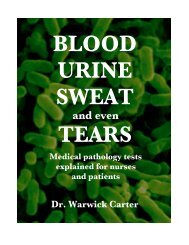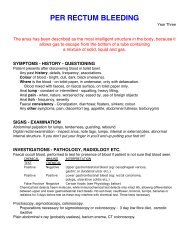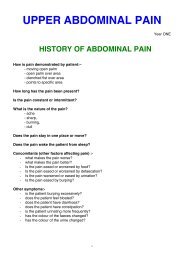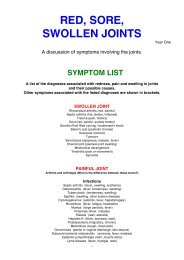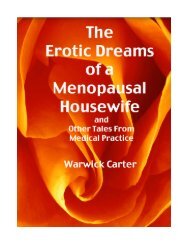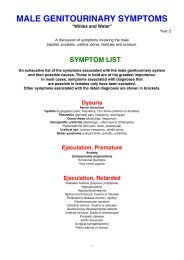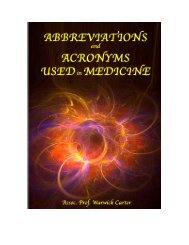Menopause A to Z.pdf - Medwords.com.au
Menopause A to Z.pdf - Medwords.com.au
Menopause A to Z.pdf - Medwords.com.au
You also want an ePaper? Increase the reach of your titles
YUMPU automatically turns print PDFs into web optimized ePapers that Google loves.
MENOPAUSE A <strong>to</strong> Z<br />
particularly in poorer countries. These poor women constantly dribble urine through their vagina.<br />
Rarer c<strong>au</strong>ses include severe allergy reactions affecting the genitals, psychiatric disorders (eg. severe depression)<br />
and birth abnormalities of the bladder structure.<br />
X-rays of the bladder and kidneys, and cys<strong>to</strong>scopy (looking in<strong>to</strong> the bladder through a thin tube) can be used <strong>to</strong><br />
investigate the c<strong>au</strong>se of the incontinence. Incontinence is not a disease but a symp<strong>to</strong>m, and the responsible disease<br />
needs <strong>to</strong> be diagnosed before any treatment can start, although medications such as propiverine, trospium or<br />
<strong>to</strong>lterodine may be useful in some patients.<br />
INSOMNIA<br />
Insomnia is an inability <strong>to</strong> sleep, either a difficulty in getting <strong>to</strong> sleep, waking repeatedly or for prolonged periods, or<br />
early morning waking (EMW) after initially falling asleep. Sleep is as essential for the normal functioning of the human<br />
body as food and drink. Doc<strong>to</strong>rs do not <strong>com</strong>pletely understand why we need sleep, but they do understand what<br />
happens when we are asleep.<br />
There are two main types of sleep - deep sleep and REM sleep. REM stands for rapid eye movements, and several<br />
times a night, the level of sleep lightens, and while the eyelids remain closed, the eyes themselves move around<br />
rapidly. It is during this stage of sleep that dreams occur, and it is the more valuable form of sleep. If a volunteer is<br />
observed, and woken every time s/he starts REM sleep, s/he will remain tired and irritable, and obtain little benefit from<br />
the sleep. REM sleep does not start until an hour or so after first falling asleep, and long periods of deep sleep occur<br />
between each episode.<br />
Unfortunately, many sleeping tablets induce deep sleep, but tend <strong>to</strong> prevent REM sleep, so that people using them<br />
do not benefit from their sleep as much as those who sleep naturally. This is one of the reasons that doc<strong>to</strong>rs are<br />
reluctant <strong>to</strong> use them until all other avenues have been explored.<br />
The amount of sleep needed varies dramatically from one person <strong>to</strong> another. Some require only three or four hours<br />
a day; most require seven or eight hours; others may need ten hours. As we age, our sleep needs change <strong>to</strong>o. An<br />
infant requires 16 or more hours of sleep a day; in middle age, eight hours is normal; but the elderly need only five or<br />
six hours sleep.<br />
The problem here is that older people may have less <strong>to</strong> occupy their days, and so look forward <strong>to</strong> the escape of<br />
eight hours sleep every night, but find they cannot obtain it bec<strong>au</strong>se their bodies do not require that much. This is<br />
further exacerbated by the low activity levels of many elderly people, and any midday naps they take. As a result, some<br />
elderly people seek help in obtaining extra sleep from their doc<strong>to</strong>rs by means of sleeping pills. This is not true<br />
insomnia, merely a desire for extra sleep, above what is biologically necessary.<br />
There are, of course, those who genuinely cannot get <strong>to</strong> sleep for a variety of reasons, and 15% of the population<br />
fall in<strong>to</strong> this category.<br />
Specific c<strong>au</strong>ses of insomnia include stress and anxiety (including post-tr<strong>au</strong>matic stress disorder), pain, depression<br />
(particularly early morning waking), menop<strong>au</strong>se and its associated hormonal fluctuations, snoring, the restless legs<br />
syndrome and Cushing syndrome (over production in the body of, or excessive medication with, cortisone).<br />
Numerous drugs, both illegal and prescribed, may c<strong>au</strong>se sleeplessness. Examples include alcohol, caffeine,<br />
marijuana, cocaine, slimming pills and pseudoephedrine (Sudafed) for runny noses.<br />
There are many things other than medication that can be done <strong>to</strong> ease the problem.<br />
The simple steps that anyone can use <strong>to</strong> aid sleep include:-<br />
- Bed is for sleep and sex only, not for watching television or reading.<br />
- Go <strong>to</strong> bed when you feel tired, not when the clock tells you <strong>to</strong>.<br />
Do not lie down or nap during the day.<br />
- Do not have a clock in the bedroom.<br />
- Avoid exercise immediately before bed. Take time <strong>to</strong> wind down before going <strong>to</strong> bed.<br />
- Avoid drinks containing caffeine such as tea, coffee or cola. Caffeine is a stimulant.<br />
- Do not smoke before going <strong>to</strong> bed.<br />
- Relax by having a long warm bath and/or a warm milk drink before going <strong>to</strong> bed.<br />
- Lose weight if you are obese. A slight weight loss can significantly improve sleep.<br />
- Avoid eating a full meal immediately before bedtime. Give your food a couple of hours <strong>to</strong> settle.<br />
- If you cannot sleep once in bed, get up and read a book or watch television for half an hour before<br />
returning <strong>to</strong> bed. Never lie in bed <strong>to</strong>ssing and turning.<br />
- Learn <strong>to</strong> relax by attending specific relaxation classes, which your doc<strong>to</strong>r may re<strong>com</strong>mend. Follow<br />
up by listening <strong>to</strong> relaxation tapes.<br />
- Try counting backwards slowly from 100.<br />
- Have a radio on all night tuned <strong>to</strong> a news/information station playing very quietly so that you can just<br />
understand the voice, and listen intently <strong>to</strong> what is being said when trying <strong>to</strong> go <strong>to</strong> sleep and when<br />
awake during the night.<br />
- Instead of counting sheep or worrying about your problems, focus your mind on a pleasant incident<br />
27



